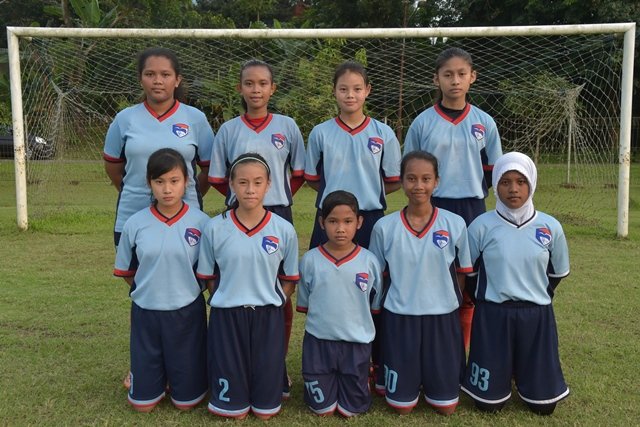
"People tell me since I'm a girl and I wear the headscarf, I'm better off at a religious school. No way," she told AFP, as she took part in the all-female practice at a football academy.
Nurjannah is among a new generation of players hoping to revive the women's game in Indonesia, a tough challenge in a conservative, Muslim-majority country where football is typically the preserve of men.
To compound problems, the country has just been hit with a FIFA ban, which means Indonesia cannot compete in world football.
Top teams are gearing up for the Women's World Cup which starts in Canada this week, but it is a rather different picture in Indonesia, where the women's team stood no hope of qualifying as it did not even have a FIFA ranking due to be being inactive for so long.
Nevertheless there is renewed optimism in Indonesia, with officials saying that the women's game is growing in popularity, and there are hopes it could eventually return to its glory days when the country challenged Asia's top teams.
Since that era in the 1960s and '70s, Indonesian football has repeatedly been hit by corruption and mismanagement, dragging down both the men's and women's teams.
But Indonesia last year revived a top-level tournament for women, which produced a national team that was sent to the AFF Women's Championship last month, the first Indonesian side to play in the regional tournament since 2011.
Some have voiced fears that FIFA's weekend decision to suspend Indonesia over government meddling in the domestic league could damage efforts. Not only are all Indonesian teams banned from international competition, but authorities can no longer draw on FIFA funds to develop women's football.
However the government insisted that the ban presents an opportunity for a "complete overhaul" of football, including the women's game. Indonesia was hit with sanctions for ousting the domestic football association, but authorities argue the move clears the way for reform as the association was responsible for many of the sport's problems.
"The government is serious and this gives us good momentum," said sports ministry official Djoko Pekik Irianto, when asked about the ban. He added that authorities hoped to have a women's league, which currently does not exist, up and running once they had completed a management reorganisation in a year.
Supporters of reviving the female game point to an increasing number of confident, young women from the country's rapidly emerging middle-class who are ready to challenge traditional values.
"I cried when my older brother told me not to play football. He said it's not proper and I should just stay in the kitchen to cook," national team player Tugiati Jawa, 29, told AFP.
"But now that I am making a living out of something I love, he has been supportive."
There is also evidence traditional attitudes are softening and relatives growing more supportive.
Nurjannah's father cheered her on from the sidelines during the recent session in Jakarta and has been taking her to practise every week.
She is not currently playing in any team but is taking part in the academy's female-only training sessions -- still a rarity in a country where women often find themselves having to join in with men's training.
And there is no shortage of talent in the world's fourth most-populous country, which has a population of 250 million people.
Some of the best female footballers come from remote and rugged Papua, the country's easternmost region, where much of the population -- who come from a different ethnic group to those on the main island of Java -- are naturally fit and athletically built.
The challenges nevertheless remain huge.
Indonesia's size has as many disadvantages as advantages, with organising national tournaments a logistical nightmare as the best players often need to be flown thousands of miles from around the country to Jakarta.
While the government has downplayed the FIFA ban, it does mean Indonesia's women are unlikely to get a chance to compete on the world stage for some time, even if they do improve.
And their recent return to international football was hardly triumphant. At the AFF tournament in Vietnam, Indonesia crashed out in the first round after losing all three of its matches, including a 10-1 defeat inflicted by Thailand.
While attitudes are changing as Indonesians become wealthier and better educated, many in the conservative country are still against the idea of women's football.
"There is potential and interest but the handicap for women's football in Indonesia is the culture and values," said Tommy Welly, a senior official from the Indonesian football association. "People think football is not a sport for women."


1725030039-0/Untitled-design-(2)1725030039-0-165x106.webp)
1725366721-0/kyle-(1)1725366721-0-165x106.webp)
1731410017-0/BeFunky-collage-(45)1731410017-0-165x106.webp)












COMMENTS
Comments are moderated and generally will be posted if they are on-topic and not abusive.
For more information, please see our Comments FAQ